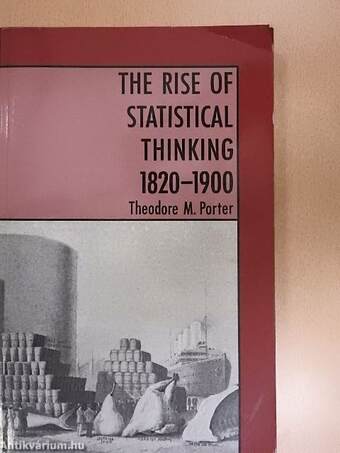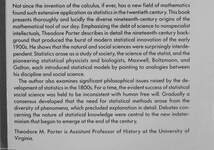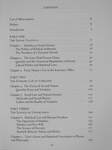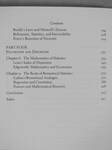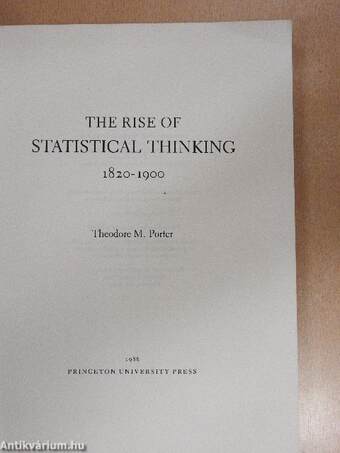1.076.314
kiadvánnyal nyújtjuk Magyarország legnagyobb antikvár könyv-kínálatát

VISSZA
A TETEJÉRE
JAVASLATOKÉszre-
vételek
The rise of statistical thinking
1820-1900
| Kiadó: | Princeton University Press |
|---|---|
| Kiadás helye: | New Jersey |
| Kiadás éve: | |
| Kötés típusa: | Ragasztott papírkötés |
| Oldalszám: | 333 oldal |
| Sorozatcím: | Princeton Paperbacks |
| Kötetszám: | |
| Nyelv: | Angol |
| Méret: | 23 cm x 15 cm |
| ISBN: | 0-691-08416-5 |
naponta értesítjük a beérkező friss
kiadványokról
naponta értesítjük a beérkező friss
kiadványokról
Fülszöveg
Not since the invention of the calculus, if ever, has a nev^ field of mathematics found such extensive application as statistics in the twentieth century. This book presents thoroughly and lucidly the diverse nineteenth-century origins of the mathematical tool of our day. Emphasizing the debt of science to nonspecialist intellectuals, Theodore Porter describes in detail the nineteenth-century background that produced the burst of modern statistical innovation of the early 1900s. He shows that the natural and social sciences were surprisingly interdependent. Statistics arose as a study of society, the science of the statist, and the pioneering statistical physicists and biologists. Maxwell, Boltzmann, and Galton, each introduced statistical models by pointing to analogies between his discipline and social science.
The author also examines significant philosophical issues raised by the development of statistics in the 1800s. For a time, the evident success of statistical social... Tovább
Fülszöveg
Not since the invention of the calculus, if ever, has a nev^ field of mathematics found such extensive application as statistics in the twentieth century. This book presents thoroughly and lucidly the diverse nineteenth-century origins of the mathematical tool of our day. Emphasizing the debt of science to nonspecialist intellectuals, Theodore Porter describes in detail the nineteenth-century background that produced the burst of modern statistical innovation of the early 1900s. He shows that the natural and social sciences were surprisingly interdependent. Statistics arose as a study of society, the science of the statist, and the pioneering statistical physicists and biologists. Maxwell, Boltzmann, and Galton, each introduced statistical models by pointing to analogies between his discipline and social science.
The author also examines significant philosophical issues raised by the development of statistics in the 1800s. For a time, the evident success of statistical social science was held to be inconsistent with human free will. Gradually a consensus developed that the need for statistical methods arose from the diversity of phenomena, which precluded explanation in detail. Debates concerning the nature of statistical knowledge were central to the new indeter-minism that began to emerge at the end of the century.
Theodore M. Porter is Assistant Professor of History at the University of Virginia. Vissza
Témakörök
- Idegennyelv > Idegennyelvű könyvek > Angol > Természettudományok > Matematika
- Idegennyelv > Idegennyelvű könyvek > Angol > Művelődéstörténet
- Művelődéstörténet > Eszmetörténet > Tudományok
- Művelődéstörténet > Átfogó művek, tanulmányok
- Természettudomány > Matematika > Idegennyelvű
- Természettudomány > Matematika > Statisztika
- Természettudomány > Matematika > Története
- Filozófia > Témaköre szerint > Szakfilozófiák
- Idegennyelv > Idegennyelvű könyvek > Angol > Filozófia > Témaköre szerint > Szakfilozófiák
Theodore M. Porter
Theodore M. Porter műveinek az Antikvarium.hu-n kapható vagy előjegyezhető listáját itt tekintheti meg: Theodore M. Porter könyvek, művekMegvásárolható példányok
Nincs megvásárolható példány
A könyv összes megrendelhető példánya elfogyott. Ha kívánja, előjegyezheti a könyvet, és amint a könyv egy újabb példánya elérhető lesz, értesítjük.



